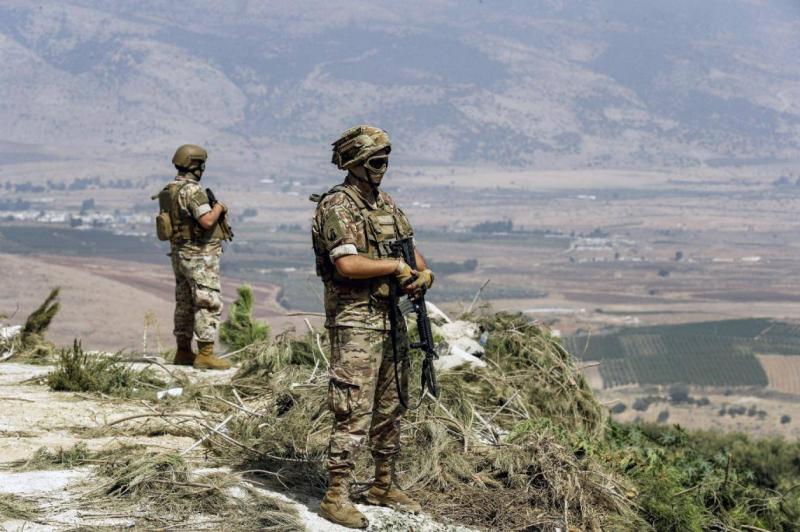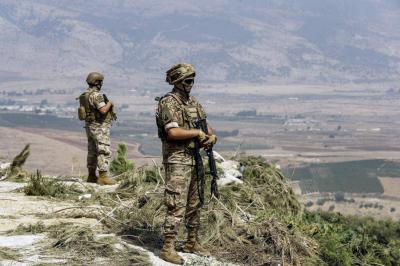The intensive security campaign launched by the Lebanese Army in the Bekaa region of eastern Lebanon over the past two weeks is part of a long-term effort that began early last year to dismantle drug trafficking networks, including their production and smuggling, as well as pursuing human traffickers along the Lebanese-Syrian borders, and arresting those implicated in other crimes such as kidnapping and theft. Residents in the Bekaa express relief over the army's measures, which they say "significantly undermined the activities of gangs and lawbreakers," noting that their presence has decreased and they are now hiding from sight amidst ongoing military vigilance.
"They do not feel safe," says a source in Baalbek, describing the condition of the wanted individuals who are evading ongoing pursuit, forcing them to seek refuge in Syrian border villages inhabited by Lebanese in the outskirts of Qusayr. Meanwhile, army units and the intelligence directorate are conducting continuous ambushes and raids, the most notable of which occurred last week, resulting in the deaths of three soldiers in a shootout with suspects and the arrest of 12 individuals wanted for shooting at army units.
Since the beginning of last year, pursuits have been intensively ongoing, according to security sources speaking to "Asharq Al-Awsat." They indicated that the number of prominent detainees from drug trafficking networks in the Bekaa and Baalbek-Hermel governorates has reached 25 Lebanese and 21 Syrians since the beginning of 2022 until last week. The seizures included various types of drugs, including approximately 560 kilograms of Captagon pills, alongside 1.4 million narcotic pills. In terms of hashish, over 10 tons were confiscated, in addition to 45 tons of marijuana, and 200 kilograms of cocaine, alongside other drugs like cocaine base and cannabis seeds.
Local sources report that army pursuits targeted "the big players" in the drug trade, with daily and weekly raids often executed by the army's special forces supported by intelligence units, alongside some military units from various brigades. These raids have led to the dismantling and scattering of some heads of these networks, forcing them to flee to Syrian villages inhabited by Lebanese. The measures have not spared even those working in drug dens or helpers involved in the trafficking and promotion fields. There are reports of fatalities among major drug traffickers in the Baalbek-Hermel area and the central and western Bekaa who fell during shootouts in raids.
The army frequently concludes its operations by demolishing and removing drug dens and burning their contents to prevent the reuse of these locations, including the demolition of dens in the southern and northern neighborhoods of Sharawneh and in Hawrtaala. Alongside the significant decline in drug trafficking, the production of drugs has diminished due to the loss of certain materials used in Captagon pill production as a result of ongoing pursuit and seizure, coupled with tightened import controls and monitoring.
Security sources in the Bekaa recall that the Lebanese army previously collaborated with the border regiment to intercept three shipments of Captagon and hashish that were prepared for smuggling into Syria via the outskirts of the towns of Nahle, Arsal, and Brital along the eastern mountain range, intending to smuggle them to some Arab countries.
For years, some individuals outside the law have altered the security landscape of the region, depicting northern Bekaa as a hostage to these gangs and a refuge for those pursued and wanted who have been issued dozens of search and investigation warrants. This image has affected the economic and tourism activity in the region, known for its impoverished residents, who have suffered from the repercussions of the Syrian security crisis in recent years.
In this context, the measures aim to establish security in the region, including raids that target individuals involved in theft and kidnapping for ransom. Army units have also worked on dismantling surveillance cameras on the rooftops of high buildings in the main streets and neighborhoods to monitor the army's movements.
Residents of Baalbek praise the measures that extend beyond just pursuing drug traffickers and include chasing down kidnapping and smuggling gangs. A local source stated that "what the army is doing is restoring security to the region and enforcing safety within it." The extensive deployment of army units and the ongoing operations contribute to combating any illegal activity in the border area with Syria, particularly the smuggling of goods and individuals, as army units fight against efforts to smuggle people across the northern borders between Lebanon and Syria, where hundreds of Syrian families have been entering from Idlib, Deir ez-Zor, and Raqqa towards Lebanese territory.
The army is stopping them through ambushes and makeshift checkpoints established in the Hermel region, the Baalbek plain, and northern Bekaa, arresting the heads of smuggling gangs among Lebanese and Syrians who charge between $300 and $500 for each person they smuggle into Lebanon. The Lebanese army has detained hundreds of Syrians entering at a rate of 40 to 50 individuals daily and is working on returning them to Syria, handing some over to Lebanese General Security, depending on the capacity of the agency that processes their return after conducting investigations.
An security source in the Bekaa confirmed that the Lebanese army has recently arrested 70 of the major human traffickers and worked to seize their vehicles involved in smuggling operations in the Hermel plain and northern Bekaa. Syrians often attempt to pass through Lebanon to join human traffickers bound for certain European countries via organized maritime routes. The Lebanese army, in cooperation with General Security, managed to return over 600 individuals to Syria last year.




